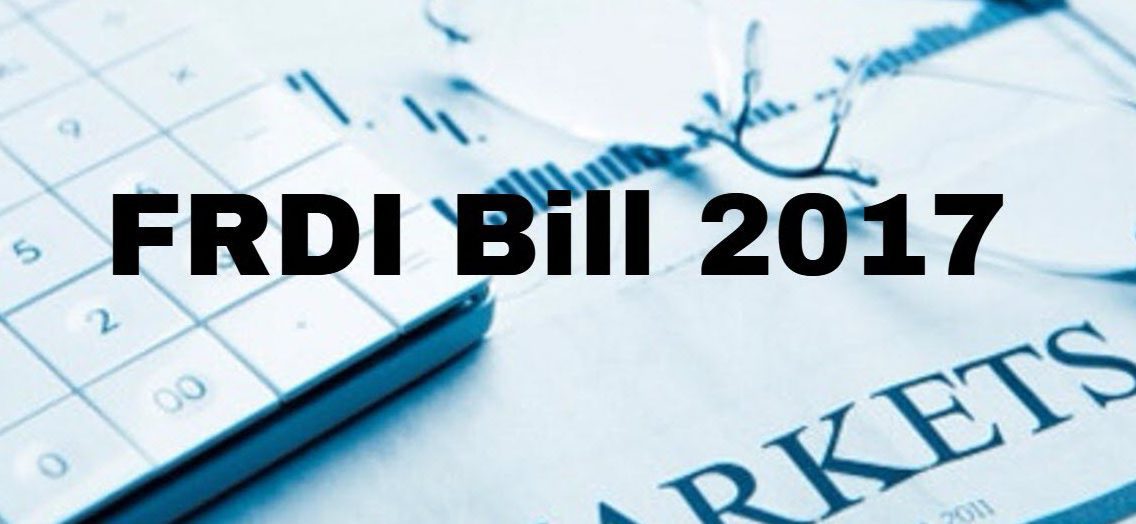Will the FRDI Bill become a law with enhanced investor protection, as per the assurance of the finance ministry? Tarun examines the debate on the said Bill, in the weekly column, exclusively from Different Truths.
A ball, when set in motion, will continue to roll unless stopped by an external force.
Similar is the case of expectations. The human mind tends to believe in continuity, although all swear by “change is the only constant thing in life”.
This is something I am seeing in the context of the Financial Resolution and Deposit Insurance (FDRI) Bill, 2017, or simply FRDI 2017 Bill that is really taking all the headlines in the media nowadays.
Let us first see what this bill is. This is a proposed law by the government of India, wherein, a new mechanism is to be put in place for preventing the bankruptcy of the banks, financial institutions, companies and stock exchanges. The bill proposes to form a ‘Resolution Corporation’ with large powers to do as it deems fit to not only prevent but to also provide for the resolution of troubled entities.
 This objective is fine. The need for this was mooted after the financial crisis of 2008, in a discussion of the G20 nations, of which India is a part. In 2008, many financial institutions in the western world were bailed out on public money, in the process creating a moral hazard. The moral hazard meant that mistakes of certain financial managers were passed onto the innocent taxpayer. To correct this anomaly, G20 formed a Financial Stability Board, which was concerned with policies to prevent this financial recurrence.
This objective is fine. The need for this was mooted after the financial crisis of 2008, in a discussion of the G20 nations, of which India is a part. In 2008, many financial institutions in the western world were bailed out on public money, in the process creating a moral hazard. The moral hazard meant that mistakes of certain financial managers were passed onto the innocent taxpayer. To correct this anomaly, G20 formed a Financial Stability Board, which was concerned with policies to prevent this financial recurrence.
Thus, the objective has been to prevent a bailout of ailing financial institutions, (on public money), and instead, go for a mechanism of bail in, meaning, that the institutions use their own resources to come out of their problematic situation.
On paper, this is laudable. Let the institution alone suffer, for its follies. However, a depositor with a financial institution immediately comes to be at risk in such a situation. His deposits might be used by the all-powerful ‘Resolution Corporation’ to bail in the ailing institution. Let’s go a little deeper in this, as this provision is what is causing all the consternation, especially on social media.
As per the law today, the banks get their deposits insured by the Deposit Insurance and Credit Guarantee  Corporation. But there is a maximum cap on the insurance level. A maximum of one lakh rupees per depositor per bank can be insured, even though the deposit may be of an amount much more than one lakh. This insurance ensures that the depositor gets at least one lakh rupees, in the event of failure of the said financial institution. So even today, the deposits of depositor may be at risk theoretically, in case the institution fails.
Corporation. But there is a maximum cap on the insurance level. A maximum of one lakh rupees per depositor per bank can be insured, even though the deposit may be of an amount much more than one lakh. This insurance ensures that the depositor gets at least one lakh rupees, in the event of failure of the said financial institution. So even today, the deposits of depositor may be at risk theoretically, in case the institution fails.
However, the RBI has ensured that such a thing doesn’t happen in India. The RBI has always protected the investors, by asking bigger banks to take over the smaller failing banks, thus ensuring the depositors always get their money back, insurance or no insurance.
Now come back to the proposed regime with bail-in. The new Corporation may take over this function of RBI, which in turn may be reduced to an advisory role. However, this is not clear yet. The Standing Committee of the Parliament is looking into that.
The finance ministry has issued statements, assuaging the fears about bail-in. The finance minister himself has said that the government intends to double the insured amount, than before.
Thus, the FRDI Bill will become a law with enhanced investor protection, as per the assurance of the finance ministry. Where is the problem then?
 The problem is that the banks are already beset with an NPA loan, or bad debt rate of 12.6%, according to a conservative estimate. This had never been so before. Now, with RBI or the government set to be absolved of the bailout responsibility, there is a natural fear that the banks’ failure rate might become more of a near-term reality. And, the bail-in would make investors lose their hitherto safe money. Even
The problem is that the banks are already beset with an NPA loan, or bad debt rate of 12.6%, according to a conservative estimate. This had never been so before. Now, with RBI or the government set to be absolved of the bailout responsibility, there is a natural fear that the banks’ failure rate might become more of a near-term reality. And, the bail-in would make investors lose their hitherto safe money. Even
ASSOCHAM has asked the government to be careful with such a law, and give it deep consideration.
What do I feel about it? I think it is like a medicine to cure the ailment, with a lot of side effects. For one, what is there to prevent NPAs happening in the future? The government is doing a lot of things, like an injection of fresh funds in the banks, insolvency code, and now this bail-in, but it is still like treating a sick man, rather than preventing the sickness from happening itself.
And the public will continue to live with unease, as once an entity like the Resolution Corporation comes into being, it will definitely do its duty, and that is allowing the failing entities to fail and die out. This might be testing the patience of depositors, although I am sure the government will act benevo lently, and not allow depositors be at risk.
lently, and not allow depositors be at risk.
But still, it reminds me of an experiment in behavioural economics. The medical representatives in the USA found that their sales were not picking up. A consultancy mapped their sales process. And advised them to substitute their standard sales pitch from “This medicine has a failure rate of 10%”, to “This medicine has a success rate of 90%”. And lo, their sales immediately jumped.
Both letter and spirit of the law are important, as is famous in the annals of law. Similarly, in economic management, the law may be important, but the spirit with which the government works remains to be seen. I am sure, a democracy ensures that the spirit is good too.
©Tarun Gupta
Photos from the Internet
#Loans #BanksOfIndia #G20Nations #DepositInsuranceandCreditGuaranteeCorporation #FRDIBill2017 #NPA #SalesPitch #RBI #BarefootEconomist #DifferentTruths







 By
By
